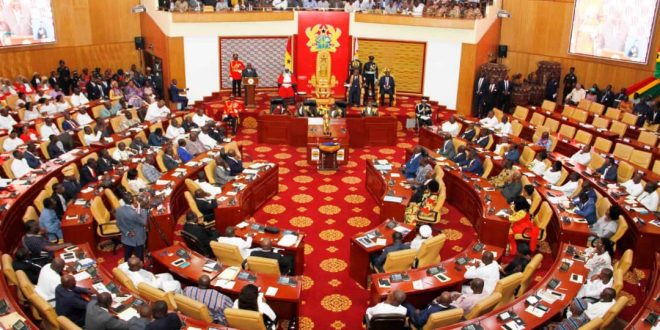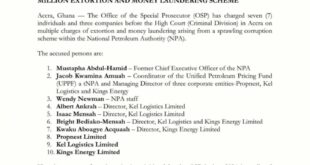Ghana achieved Independence on 6th March, 1957. The political struggles that preceded this historic event date back over a hundred years.
The early period of nationalist struggle for political independence created political awareness and desire to assert the right of self-determination both for the individual and the State.
As far back as 1850, Ghana, then The Gold Coast, was given its own Legislative Council to advise the colonial Governor in enacting legislation mainly in the form of Ordinances “for the peace, order and good government of the subject.” The Legislative Council was purely advisory as the Governor exercised all legislative and executive powers.
Ghana (or the Gold Coast at the time), established its first semblance of a Parliament (Legislative Council) in 1850 with representatives appointed by the British colonial government. The Legislative Council consisted of the Governor and at least two other person appointed by the colonial administration.
The Legislative Council was required to make laws and ordinances necessary for the peace, order and governance of the Gold Coast. The legislature at the time was merely an advisory body and had no oversight power over the colonial government. Various agitations against the colonial authorities for equal representation and universal suffrage led to the transformation of the non–elected legislature into an elected Legislative Assembly in 1954. After gaining independence in March 1957, Ghana saw four Parliaments under four different Republics (i.e. First Republican Constitution of 1960, the Second Republican Constitution of 1969, the Third Republican Constitution of 1981 and the Fourth Republican Constitution of 1992).
The incessant interventions of the military in politics truncated the terms of the first three Parliaments in 1966, 1972 and 1981. The democratic instability that was witnessed over the period ensured that Parliament was an unstable governance institution until 1993, when democracy was finally restored under the Fourth Republic.
In 1916 the Legislative Council was reconstituted to include nine nominated officials, six of whom were Africans, as opposed to eleven officials and the Governor. The first Legislative Council elections ever to be held took place in 1925 under the Guggisberg Constitution. Under this arrangement the Governor still retained complete control of legislation.
Under the 1946 Bums Constitution which replaced the Guggisberg Constitution, the representatives of the people formed the majority in the Legislative Council. The Governor ceased to be ex-officio President of the Legislative Council and an unofficial Member was appointed President. This system continued until 1951 when the Legislature elected its first Speaker under the 1950 Constitution.
In 1951 the first large-scale elections to the Legislative Assembly took place when 75 Members were elected. There were three nominated ex-officio Members and six special Members representing commercial and mining interests.
The 1954 transitional Constitution provided for an Assembly of a Speaker and 104 Members elected on party lines on the basis of universal adult suffrage.
In 1957, when Ghana achieved full political Independence the constitution was fashioned after the Westminster model. In June, 1960, ten women were elected by the National Assembly to fill specially created seats. This was done to expose women to parliamentary life. This system of election was not intended to be permanent. The Act made no provision for filling a vacancy caused by death, resignation or expulsion of a woman Member.
On 1st July, 1960 Ghana became a sovereign unitary Republic. In February, 1964 Ghana adopted a one-party system of Government. The First National Assembly of the Republic was , dissolved in 1965 and a general election in which all the 198 Members, all of them Members of the national party, the convention People”s Party (C.P.P.) were elected unopposed.The 1964 Constitutional Amendments among other things increased the powers and prerogatives of the President.
In February, 1966 the First Republican Government was overthrown by a military coup which installed a military government that remained in power up to September, 1969, when, on its own volition, it handed over power to another constitutionally elected government, and thereby restored parliamentary rule once again.
After only 22 months in office the second parliamentary democracy also succumbed to another military rule between January 1972 and October 1979, when under much political pressure, that military government was compelled to usher in the Third Republican parliamentary system. In December 1981 parliamentary democracy was once more thrown into cold storage as a result of yet another military coup. However, the country returned to constitutional rule again on 7th January, 1993.
Overview
Ghana has a unicameral Legislature composed of 275 Members of Parliament from single-member constituencies with an Executive Presdient who appoints Ministers majority of whom by the Constituion have to come from Parliament.
Life of ParliamentA term of the Parliament of Ghana spans over a period of four (4) years from the first Sitting day following a general election as stipulated by Article 113 (1) of the 1992 Constitution. Article 112 (2) of the same Constitution provides that, a Session of that period between the last and first Sitting of the next Session of Parliament shall not amount to twelve (12) months. Within a Session of Parliament, there are periods of Meetings and Sittings.
A Session of Parliament is the Sitting(s) of Parliament commencing upon the first Meeting of Parliament after a dissolution and ending when Parliament is dissolved. By a Constitutional Instrument, the Speaker of Parliament exercises the power of summoning a new Session of Parliament. In practice, the first Session of Parliament begins on the 7th January after a general election. On the average, Parliament Sits for 28 weeks and goes on recess for 24 weeks within a Session. The House Sits from Tuesday to Friday, making an average of 132 Sittings in a Session.
Meeting of Parliament
A Session of Parliament is made up of periods known as Meetings. A Meeting is a Sitting or Sittings of Parliament commencing when Parliament first meets after being summoned at any time and ending when Parliament is adjourned sine die or at the conclusion of a Session.Ordinarily, there are three Meetings in a Session:
-
- 1st Meeting: January to March
-
- 2nd Meeting: May to July
-
- 3rd Meeting: October to December
- 3rd Meeting: October to December
Sitting of Parliament
A Sitting of Parliament is the period during which Parliament Sits continuously without adjournment.
Political system
Administratively, Ghana is divided into 10 regions with 216 districts. Each region has a Regional Coordinating Council headed by a Regional Minister appointed by the President who co–ordinates the activities of districts under their jurisdiction. At the local level the District Assemblies are the highest political authority. Memberships of the Assemblies are elected from various electoral areas to represent their communities at the Assembly. In addition, the government nominates 30% of the membership in consultation with the traditional authorities in each district.
The Member of Parliament whose constituencies fall within the district is an ex–officio member of the Assembly without a voting right. The local assemblies are allowed to pass by–laws to regulate various activities in the district.
The districts are headed by the District Chief Executives who are nominated by the President and approved by the Assemblies. Ghana has also experienced different political systems at various periods of its political history: parliamentary system (1957–1960; 1969–1972), presidential system (1960–1964; 1979–1981), and one–party system (1964–1966). As a unitary state, Ghana’s system of government is classified as hybrid or semi–presidential. The President, who is elected for a four year term, is enjoined by article 71 of the 1992 Constitution to appoint majority of Ministers from among Members of Parliament (MPs). MPs who are appointed as Ministers continue their tenure as MPs. The Vice President, Ministers and Deputy Ministers who are not MPs are ex–officio Members of Parliament with no voting rights.
Electoral system
The majoritarian system or the First Past the Post is the electoral system that has been adopted for both presidential and parliamentary elections in Ghana. At the parliamentary level only a simple majority is needed for a candidate to be elected. Currently, 23 political parties are registered with the Electoral Commission of Ghana, the body that oversees the conduct of elections. Since the Fourth Republic, two major political parties, the National Democratic Congress (NDC) and the New Patriotic Party (NPP) constitute around 96% of the seats in Parliament with the remaining 4% shared among three other parties and independents MPs. It has become extremely difficult for smaller parties to marshal majorities to win seats in the legislature. Their share of the total electoral vote continues to dwindle.
Source: parliament.gh
Disclaimer: MyGhanaMedia is not responsible for this report and its content.There are four types of content published on MyGhanaMedia daily: curated content; syndicated content; user-generated content; and original content.


Send your news stories to myghanamedia@gmail.com and Chat with us via WhatsApp on +233 200818719
 MYGHANAMEDIA.COM Best Source Of Latest News
MYGHANAMEDIA.COM Best Source Of Latest News



